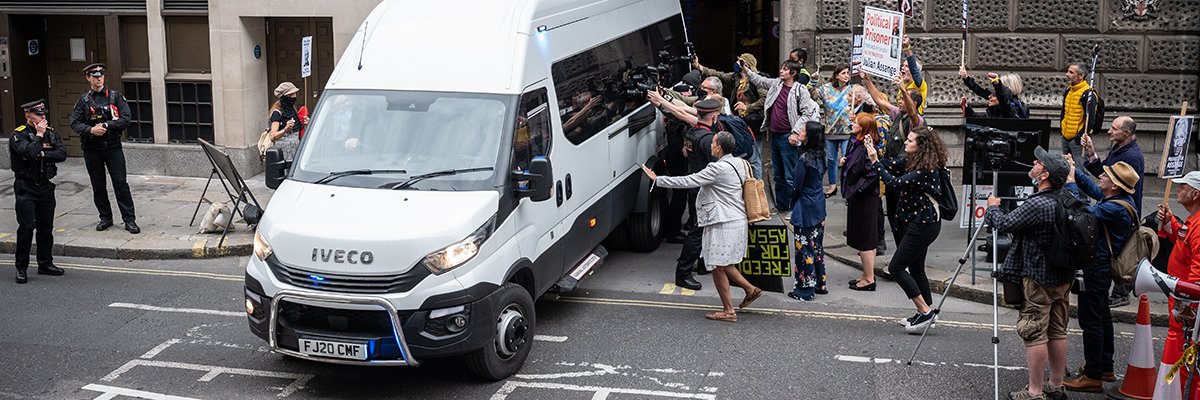Julian Assange’s medical conditions did not prevent him from being extradited for trial or being held in a US prison, a court heard today.
Dr Nigel Blackwood, an NHS consultant psychiatrist told theOld Bailey that the WikiLeaks’ founder had “moderate depression” and that his risk of suicide could be managed.
Blackwood said that Assange was a very resourceful and capable man and is able to resist any impulse to suicide.
Assange’s mental health and risk of suicide is one of the factors that will determine whether the WikiLeaks founder can be extradited to the US.
Assange’s defence team is relying on precedent-setting cases when the UK refused the extradition of Gary McKinnon in 2012 and Lauri Love in 2018 to face hacking charges.
In Love’s case the high court agreed that his extradition to the US would have an adverse effect on his mental well-being in the light of his Asperger’s syndrome and history of depression.
Giving evidence on the 13th day of the hearing at the Old Bailey, Blackwood told the court that when he examined Assange in April, he found him to be “moderately depressed”.
There was some risk of Assange committing suicide but this risk had been carefully managed by Belmarsh prison.
He said that he disagreed with a report from Michael Kopelman, head of neuropsychiatry at King’s College London that Assange had been “severely depressed with psychotic symptoms” and that his life would be at risk if extradited to the US.
Blackwood accepted that Assange had a recurring depressive disorder but was puzzled why Kopelman, a witness for the defence, had placed Assange at the most extreme end of the disorder.
“If it was the case that he had severe depression with psychotic features it was absolutely incumbent on [the prison doctor] to refer him out for assessment and treatment,” he said.
The fact that they did not suggested that the team responsible for Assange’s mental health care did not view him at the “extreme end”.
Blackwood said that Assange was initially concerned that Blackwood was working for the US government and that the CIA would harvest any vulnerabilities from the report to use against him.
Assange was at an elevated risk of suicide, but suicide is a rare event, and the risk can be managed, Blackwood said.
He said that Assange had traits of autism spectrum disorder (ASD) but not enough to get him “over the line”.
Assange was not open with prison doctors
Sondra Crosby, a professor of medicine at Boston University told the court that she had visited Assange when he was in the Ecuadorian Embassy in 2017 and in Belmarsh prison in 2019.
During a visit to Belmarsh prison in October 2019, she said Assange told her he had not disclosed the extent of his suicidal thoughts to prison staff.
“Mr Assange told me he was not revealing the full extent of his depression and suicide plans to prison doctors and mental health specialists,” she said. “This is something I see very commonly in prisons.”
She said prisoners worried that if they were open about their conditions they would be put under greater observation or face other restrictions.
Assange appeared to be severely depressed, discussed suicide and “talked as if he were dead,” she said.
“He told me that the one thing that was very helpful was his access to the Samaritans,” she said.
Assange met all the criteria for major depression, and it was impacting has ability to function.
“I felt that his risk of suicide was very high. What he always said was a trigger would be his extradition to the US where he felt his life would be intolerable,” she said.
Assange could face solitary confinement
Edward Fitzgerald QC for the defence said that Assange would be kept under conditions that amounted to solitary confinement in a US federal prison.
During cross examination, Blackwood agreed that he had based his conclusion that there was no solitary confinement in US prisons on the witness statement by US prosecutor Gordon Kromberg.
He said he had not looked at evidence from defence experts that found that Assange was likely to be kept in a cell 22 to 23 hours a day with little or no contact with other prisoners.
Fitzgerald referred to a report from a US prison warder that said the only contact prisoners under Special Administrative Measures (SAMS) would have is when prison staff open the viewing slot in their cells, or when prison staff delivered food through a secure slot.
“If that pertains, and that appears to be the most pessimistic assessment, it may have an impact on his mental state, yes,” said Blackwood.
The court heard that Assange had formed a trusting relationship with a psychologist at the prison, who had noted numerous occasions were Assange reported suicidal feelings and depression.
Blackman agreed that he had not spoken to her for his report.
Blackman had written that it would “not be unjust” to extradite Assange to the US, but agreed under cross examination that that was a decision for the court not a medical doctor.
Assange referred to the prison health care unit as “health don’t care” and had told Blackwood that it had “turned him into an hallucinating puddle on the floor”, the court heard.
The case continues.












